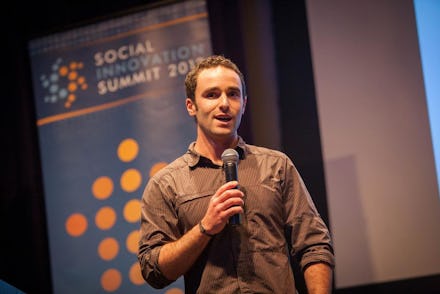7 Powerful Relationship-Building Strategies From the World's Entrepreneur of the Year

Daniel Epstein has all the charm of an enthusiastic schoolboy on the first day of summer camp.
His fervor for entrepreneurship and startups has led him to form the Unreasonable Group. The goal: Accelerate the world's most unreasonable ventures. Epstein, age 28, is the founder of the Unreasonable Institute, Unreasonable Adventures, Unreasonable at Sea, Unreasonable Media and Unreasonable.is. Epstein was also recently named an "Entrepreneur of the Year" by the World Entrepreneurship Forum alongide other notable entrepreneurs, including Richard Branson.
In an interview with PolicyMic, Epstein explained the bedrock of his philosophy: He believes entrepreneurship is the answer to nearly all the problems we face today. While he admits to sleeping little and working much, don't expect Epstein to complete his daily tasks with under-eye circles or signs of stress. Where others see overwhelming problems, he sees unfortunate opportunities.
"Everything an organization wants to achieve it achieves through its people," says Epstein.
Below is what he finds to be the most important steps to building strong, lasting relationships.
1. The person you're talking to is always the most interesting person in the room.
Have you ever talked with someone whose eyes are constantly flitting around the room? It's awful. Why? Because as Robert Frost said, "We all have an irresistible desire to be irresistibly desired." Looking around the room signals that there is something or someone more interesting than the person you're talking to. One of the most important keys to building powerful relationships is never to avert your eyes when you are talking with someone else.
Holding eye contact, even amidst a bustling room or people chatting nearby enables you to be fully present in your conversations and shows the other person how important they are to you. A friend of mine, Kim Schienberg once framed this beautifully. She believes that no matter who you are talking to in a room, you should have the perspective that they are the most interesting person in the room and it's your job to figure out why. I love this perspective.
2. Listen and learn before you speak.
You would be shocked at how common it is for people to jump headlong into their agenda in conversations without learning anything about the person they are talking to. When you meet someone, never start by talking about yourself. Ask them not just what they do (they always get asked that), ask them why they do what they do and how they got to be doing what they do. What's their story?
This will allow you to listen and identify their interests, passions and what excites them. Inevitably, if they are remotely interested in who you are, they will ask you the same questions. Now you can speak to their interests and passions.
3. You connect with people the most when you're most vulnerable.
Your greatest strength in establishing powerful relationships is to be honest about your greatest weaknesses. We have been socially-conditioned to worry about what others will think when we share our failures, sincere thoughts and what we don't know with them. The truth is that these moments of vulnerability are the very moments when we connect most with other people. It's not only okay to be vulnerable, it's crucial.
4. Don't be afraid to ask for help.
One of the most important rules of building relationships and networking is simply to ask. If this is hard for you, change your paradigm. A good friend of mine and Unreasonable mentor, Bob Patillo, once told me, "Our needs make room for other people's gifts." It all boils down to being truthful. If someone can really help you, do not be hesitant to ask. When you ask for help, and if you do so genuinely, the worst anyone will say is "no." In short, get over your justifications and rationalizations, stop over thinking things and just make the ask.
5. Follow up and follow through.
When I was working on my first startup as a freshman at the University of Colorado, I had lunch with a local entrepreneur and asked him one pointed question: What will set me and my team apart from the rest? He simply responded, "Follow-up and follow-through." After any great conversation, send a follow-up email and just simply let the person know how much you appreciate their time and thoughts. And if you want to distinguish yourself from nearly 95% of everyone out there, follow-through on the promises you make. The key to this statement is to make certain that when you tell someone you are going to do something, you will have the time to do it well.
6. You need to believe in your ideas with conviction.
If you are going to get others excited about what you are doing, you have to believe in what you are doing more than anyone else in the world. To your core, you need to believe in the importance of it. Anything less and the person across the table from you may wonder: "Why should I help them with this idea when they don't even believe in it?" Be bold and be confident. Remember though, you must be confident about what you do know, but equally important about what you don't know (be humble). This level of transparency is key to building quality relationships and networking. People are perceptive. If you aren't genuine, they will know it.
7. A business is successful because of the people.
According to Al Gore, an old African proverb says, "If you want to go fast, go alone. If you want to go far, go together." Whether or not the source is correct, I couldn't agree more with the proverb. If you want to create unreasonable impact, you are going to have to be able to build unreasonably powerful relationships with your teams, partners, investors, networks and friends. The key is simple: Be human. In the end, business is not business; business is people.